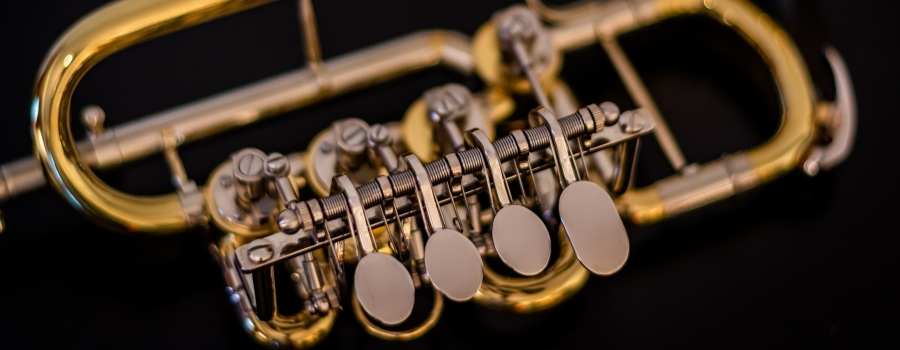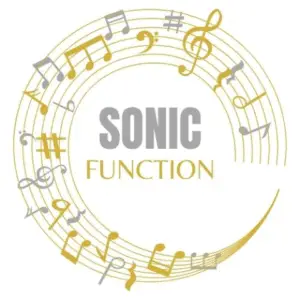
Most people who have been in concert band in grade school…or were fans of Chumbawumba back in the day…are familiar with the trumpet. Usually, the most common trumpet will be a Bb or C trumpet, both are nearly identical (save for the slight key difference) and both have the standard three valves.
But! Trumpets come in all shapes and sizes, but one thing that is common among all modern trumpets is the presence of valves…usually, three as mentioned above, but some trumpets have four valves.
So what’s the deal with that fourth valve…and what does it do for the trumpets that have them? I love the trumpet…if I hadn’t picked the saxophone in fifth grade, the trumpet was my next choice…and I especially love the lesser-known instruments in our sonic world, so I thought I’d put together this article and give you all the info I have on trumpet with four valves.
Why Do Some Trumpets Have Four Valves?
Generally, the most mainstream member of the trumpet family to have four valves is the piccolo trumpet. The fourth valve on any trumpet that has one is generally used to extend the range of the instrument and to help with intonation by allowing for alternate fingerings on certain notes.
The fourth valve on a trumpet is sometimes referred to as a “compensation system.” This is because it not only extends the instrument’s range, but it also aids in the correction of certain intonation issues by providing alternative fingerings.
Again, if you run across a trumpet that has four valves it’s highly likely that it is a piccolo trumpet. But there are other instruments in the trumpet family that sometimes have them…usually, trumpets pitched in keys other than Bb or C.
Schilke makes trumpets in a variety of alternative keys…such as G and Eb…both of which include a useful fourth valve that extends the instrument’s range by a fourth.
I feel I should mention a quick distinction…When I speak of valves in this article, it refers to both piston (what you see on most instruments) and rotary valves (like french horn valves.) I go into more detail about what Rotary Valve Trumpets are over here in this article.
What Is The Difference Between A Three Valve Trumpet And A Four Valve Trumpet?
In general, the biggest difference between a three-valve trumpet and a four-valve trumpet will be the number of valves. In the case of a piccolo trumpet, it will also be noticeably smaller and usually have a longer bell to body ratio than a standard Bb or C trumpet.
Valves aside, a four-valve trumpet will have the extra piston casing to accommodate the fourth valve and the instrument will be a little larger or smaller than a traditional Bb or C trumpet, depending on the key.
This isn’t so much due to the fourth valve, however, but is because the instruments are in different keys and therefore come in at different sizes…Even my go-to example of Bb and C trumpets are slightly different sizes.
| Instrument | Number of Valves | Bell Size/Bore Size |
| Bb Trumpet | 3 | 4.78 inch/.460 inch |
| Bb Piccolo Trumpet | 4 | 4 inch/.450 |
| Eb Trumpet | 4 | 5 inch/.450 inch |
| G Trumpet | 4 | 4.37 inch/.450 |
As you can see in the chart above, there are slight differences in the size of each of the trumpets…but I want to reiterate that this isn’t because of the fourth valve and is mainly dependent on the key of the instrument. An Eb trumpet needs to be larger than the piccolo trumpet in order to play in the key it is designed to play in.
What Are The Benefits Of Having Four Valves On A Trumpet?
In addition to extending the range of the trumpet, a fourth valve also helps fix any intonation problem by offering alternate fingerings.
In the case of piccolo trumpets, the fourth valve is used to extend the range (by a fourth) and allow for alternate fingerings.
Other four valve trumpets aren’t used nearly as often as the piccolo trumpet, but they benefit in similar ways with a fourth valve…extending the instruments range by a fourth and helping with tonality issues.
Do Four Valve Trumpets Cost More?
On average, a four-valve trumpet will cost more than a three-valve trumpet. This is mainly due to four-valve trumpets being more of a niche instrument since they are usually pitched in keys that aren’t used that often, such as Eb and G.
So much is going to make the prices of a trumpet vary though…brand, key, model, these are just a few of the aspects that go into pricing.
For example, a Schilke Bb Piccolo Trumpet will run about $4300 but a Yamaha Bb Piccolo Trumpet will run about $2500…the same instrument, same key, similar dimensions, both have four valves…yet they are nearly $2000 apart. In this case, it really comes down to brand. Both are reputable, celebrated brands but Schilke is considered a higher-end product.
Does A Four Valve Piccolo Trumpet Have A Bigger Range Than A Three Valve Piccolo Trumpet?
The fourth valve is used to extend the range of a piccolo trumpet by a fourth. Normally, a piccolo trumpet low note would be a sounding E at the bottom of the treble staff. A fourth valve extends the trumpet down to a sounding B below the staff.

There is some debate on if the fourth valve is really necessary since these lower notes can sound a bit muddy and argue that the character of the piccolo trumpet is all in its bright, higher notes.
In any event, the fourth valve is certainly used by many players on a regular basis and most folks seem to enjoy having that option available if they need it…even if they don’t use it as often as they might like.
Players that experiment in extended techniques such as quarter tones a micro-tonality often find that having the fourth valve helps them achieve these toes more easily or at least gives them some flexibility in achieving them.

Final Thoughts
Four-valve trumpets…with the exception of the piccolo trumpet…are fairly niche instruments since they are often in keys that won’t be needed. Most trumpet players won’t need to rush out and buy one, but at some point, you may get to a level where having these different trumpets may be helpful to your playing…if for no other reason than to have options for color.
